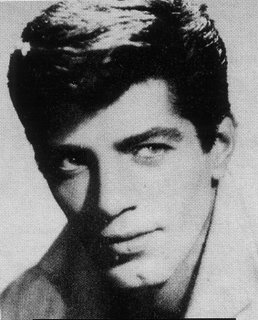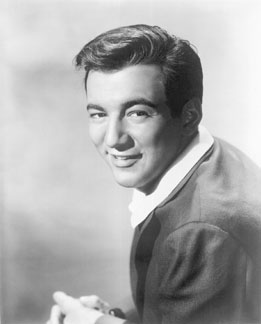Bob Sanderson (Royaltones) - Obituary
BOB SANDERSON
Born David Robert Sanderson, Nov 18, 1935, Cumberland City, Tn
Died 25 June 1994, Dearborn Heights, Michigan
Bob Sanderson was the guitarist and leader of the instrumental group The Royaltones. The group was formed in Dearborn, Michigan, in 1957, with the following line-up: Sanderson on guitar, Mike Popoff on piano, his brother Greg Popoff on drums, George Katsakis on sax and Kenny Anderson on bass. Their original name was the Paragons, a previously utilized name that was dropped in August 1958, when the group was signed by Jerry Blaine's Jubilee Records. Their first record, "Poor Boy"/"Wail!" (both sides written by Sanderson) was an immediate hit, peaking at # 17 in Bilboard and staying on the charts for 17 weeks. Quite an achievement for such a "dirty" instrumental. The follow-up, "Seesaw"/"Little Bo", again featured two Sanderson compositions and strong performances on both sides, but failed to chart. The drummer on this single - with a long drum solo on "Little Bo" - was Bill Savich, who eventually jumped ship to Johnny and the Hurricanes. The Royaltones were managed by Harry Balk and Irving Micahnik, about whom I'll be writing more this coming Friday.
They had to wait until 1961 for their second and last hit, "Flamingo Express" on George Goldner's Goldisc label (# 87). Goldner continued to release Royaltones records until the mid-sixties, in spite of poor sales. Some of these records, like "Holy Smoke" and "Royal Whirl", are quite good, but unlike other instrumental acts like Duane Eddy, Johnny and the Hurricanes, the Champs, the Ventures and Bill Black's Combo, the Royaltones didn't have a clear style of their own which made them instantly recognizable. It's not quite clear when Sanderson left the group, probably around 1962. The new guitarist/leader was Dennis Coffey, who would later score an instrumental million seller with "Scorpio" in 1972. By that time they were working mostly as studio sessioneers for the likes of Del Shannon. "When the members of the Royaltones and me recorded behind Del Shannon, Harry Balk flew us in to New York after we rehearsed the songs in Detroit, so we could record them at Bell Sound in midtown Manhattan", says Coffey in his autobiography. "I recorded with Del on many projects, including the big hit "Little Town Flirt".
Sanderson went on to perform in concert with Johnny Cash and June Carter, Roger Miller, Johnny Paycheck, Tanya Tucker, Ricky Skaggs and Conway Twitty. In 1980 he began fronting his own touring band, the Porcupine Mountain Band, which also had a few singles issued, but without chart success.
Bob Sanderson died of a heart attack at the age of 58. His obituary in the Detroit News reported that he was especially proud that his "Poor Boy" was used in the TV series "Fantasy Island" and the rock movie "Let the Good Times Roll" (1972).
Born David Robert Sanderson, Nov 18, 1935, Cumberland City, Tn
Died 25 June 1994, Dearborn Heights, Michigan
Bob Sanderson was the guitarist and leader of the instrumental group The Royaltones. The group was formed in Dearborn, Michigan, in 1957, with the following line-up: Sanderson on guitar, Mike Popoff on piano, his brother Greg Popoff on drums, George Katsakis on sax and Kenny Anderson on bass. Their original name was the Paragons, a previously utilized name that was dropped in August 1958, when the group was signed by Jerry Blaine's Jubilee Records. Their first record, "Poor Boy"/"Wail!" (both sides written by Sanderson) was an immediate hit, peaking at # 17 in Bilboard and staying on the charts for 17 weeks. Quite an achievement for such a "dirty" instrumental. The follow-up, "Seesaw"/"Little Bo", again featured two Sanderson compositions and strong performances on both sides, but failed to chart. The drummer on this single - with a long drum solo on "Little Bo" - was Bill Savich, who eventually jumped ship to Johnny and the Hurricanes. The Royaltones were managed by Harry Balk and Irving Micahnik, about whom I'll be writing more this coming Friday.
They had to wait until 1961 for their second and last hit, "Flamingo Express" on George Goldner's Goldisc label (# 87). Goldner continued to release Royaltones records until the mid-sixties, in spite of poor sales. Some of these records, like "Holy Smoke" and "Royal Whirl", are quite good, but unlike other instrumental acts like Duane Eddy, Johnny and the Hurricanes, the Champs, the Ventures and Bill Black's Combo, the Royaltones didn't have a clear style of their own which made them instantly recognizable. It's not quite clear when Sanderson left the group, probably around 1962. The new guitarist/leader was Dennis Coffey, who would later score an instrumental million seller with "Scorpio" in 1972. By that time they were working mostly as studio sessioneers for the likes of Del Shannon. "When the members of the Royaltones and me recorded behind Del Shannon, Harry Balk flew us in to New York after we rehearsed the songs in Detroit, so we could record them at Bell Sound in midtown Manhattan", says Coffey in his autobiography. "I recorded with Del on many projects, including the big hit "Little Town Flirt".
Sanderson went on to perform in concert with Johnny Cash and June Carter, Roger Miller, Johnny Paycheck, Tanya Tucker, Ricky Skaggs and Conway Twitty. In 1980 he began fronting his own touring band, the Porcupine Mountain Band, which also had a few singles issued, but without chart success.
Bob Sanderson died of a heart attack at the age of 58. His obituary in the Detroit News reported that he was especially proud that his "Poor Boy" was used in the TV series "Fantasy Island" and the rock movie "Let the Good Times Roll" (1972).







